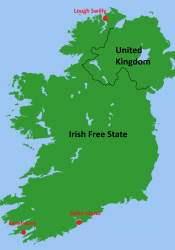1921-22 - The Formation of the Irish Free State
Despite having a history of violence and distrust between the Irish Republic and England for years prior, from approximately 1916-1921, the Anglo-Irish war, or the Irish War of Independence, resulted in the formation of the Irish Free State. To conclude the war, the Anglo-Irish treaty was signed which declared the Irish Free State as an independent dominion similar to the then Dominion of Canada and the Commonwealth of Australia within the British Empire. Because of this treaty, the Irish Free State essentially had political independence, but the treaty included the Irish Free State as part of the British Commonwealth and included a heavily debated oath of allegiance that declared,
“I….do solemnly swear true faith and allegiance to the Constitution of the Irish Free State as by law established and that I will be faithful to H.M. King George V., his heirs and successors by law, in virtue of the common citizenship of Ireland with Great Britain and her adherence to and membership of the group of nations forming the British Commonwealth of Nations” (Treaty Between Great Britain and Ireland).
There was a three-step process for the transfer of power from British rule that included a provisional government, an assembly of constituents to approve a constitution, and the election of the first parliament (Corcoran). Exactly one year after the treaty was signed, December 6th, 1922, the Irish Free State government officially gained political control under the leadership of Prime Minister William T. Cosgrave. The next day, Northern Ireland decided to remain separate from the Irish Free State.
As a newly independent state, the first few months and years of the Irish Free State suffered from many internal issues (Corcoran). Conflict broke out into what is considered to be the Irish Civil War between those who approved the Anglo-Irish treaty and those who refused to recognize the state as a free state. Because of this internal fighting, the government of the Irish Free State had a primary focus on Law and Order and therefore passed acts such as the Public Safety Act 1923, the Punishment of Offenders Act 1924, the Firearms Act 1924, and the Treasonable and Seditious Offences Act 1925 (Corcoran). Ultimately, those in favor of the Anglo-Irish treaty won the civil war, and the fighting wasted many resources in a newly independent dominion (Corcoran). Despite the internal political fighting; however, a government was established relatively quickly which is significant as the Irish Free State is still separated from Great Britain and the United Kingdom in the 21st century and remains a heavy political discussion among cultures, citizens, and religion.
https://www.youtube.com/watch?v=nF3P7cdgU_I
Works Cited
Cocoran, Donal. "Public Policy in an emerging state: The Irish Free State 1922-25." Irish Journal of Public Policy, vol. 1, no. 1, Dec. 2009.
Great Britain and Irish Free State. treaties.un.org, https://treaties.un.org/doc/Publication/UNTS/LON/Volume%2026/v26.pdf#page=9. Treaty Between Great Britain and Ireland signed in London on December 6. 1921.
The Irish Free State. , 2016. RTE The Week In Politics www.youtube.com/watch?v=nF3P7cdgU_I.

